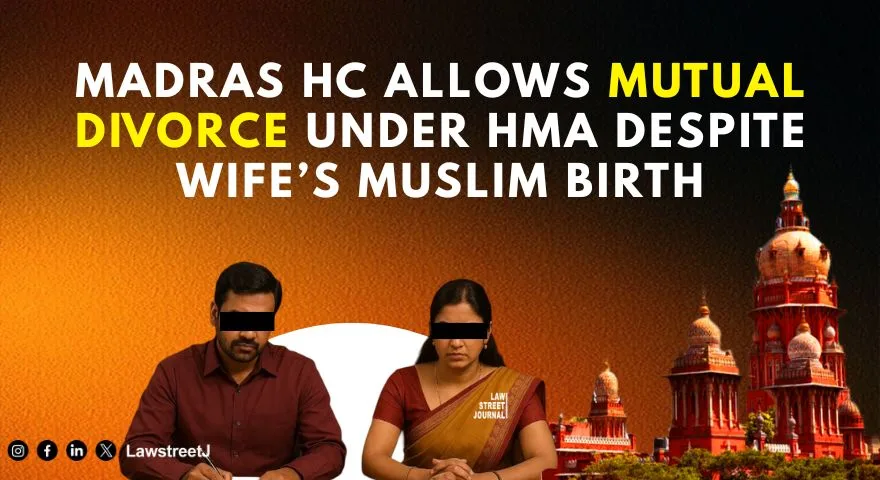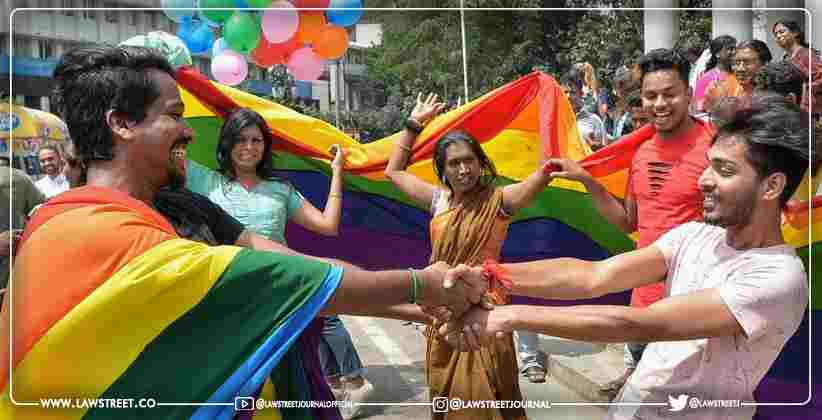Chennai: The Madras High Court has held that a mutual consent divorce petition under Section 13(B) of the Hindu Marriage Act, 1955, is maintainable when the parties solemnized their marriage in a Hindu temple according to Hindu rites and customs, even though the wife was Muslim by birth. The Court observed that conduct demonstrating conversion to the Hindu faith is sufficient, and no formal ceremony or declaration is required.
Justice P.B. Balaji set aside the trial court’s order dismissing the mutual consent divorce petition for non-maintainability, holding that the wife’s participation in Hindu marriage ceremonies and invocation of provisions of the Hindu Marriage Act sufficiently established her conversion to Hinduism through express conduct.
The Court was hearing CRP No. 1148 of 2025 filed against the judgment dated March 28, 2024, passed by the Sub Court, Ambattur in H.M.O.P. No. 77 of 2024, which had dismissed the couple’s mutual consent divorce petition.
The husband and wife had jointly filed a petition under Section 13(B) of the Hindu Marriage Act seeking dissolution of marriage by mutual consent before the Subordinate Judge, Ambattur. However, during the final hearing, the trial court noted that the wife was Muslim by birth and directed arguments on maintainability.
Relying on Section 2 of the Hindu Marriage Act, the trial court held that the Act applies only to Hindus, Buddhists, Jains, or Sikhs domiciled in India, and not to Muslims, Christians, Parsis, or Jews. Accordingly, it dismissed the petition as not maintainable.
Appearing for the petitioners, Mr. V.M. Venkatramana argued that although the wife was Muslim by birth, she married the husband in accordance with Hindu customs and rites, with the marriage solemnized at Arulmighu Balamurugan Temple, Mogappair West, Chennai. Counsel submitted that the trial judge “failed to advert to the fact that the second petitioner never claimed to be a Muslim but only a Hindu at the time of marriage, and that the marriage itself was solemnized in a manner recognized under the Hindu Marriage Act.”
It was specifically pleaded that although the wife’s parents were Muslims, her maternal grandmother was Hindu and she was raised according to Hindu customs and traditions. “By express conduct, the second petitioner has converted herself to Hinduism, though there are no formal records of such conversion,” counsel submitted.
Marriage photographs and a letter from the Secretary of A/M Sri Balamurugan Thirukoil Trust, Mogappair West, confirming the wedding were relied upon.
Justice Balaji referred to the Supreme Court’s decision in Perumal Nadar (Dead) by L.Rs. vs. Ponnuswami (AIR 1971 2352), which held:
“A person may be a Hindu by birth or by conversion. A bona fide intention to convert to the Hindu faith, accompanied by conduct unequivocally expressing that intention, is sufficient evidence of conversion. No formal ceremony is necessary.”
Finding merit in the submissions, Justice Balaji observed:
“When the second petitioner has shown by conduct that she has converted to the Hindu religion and has specifically averred in the mutual consent divorce petition that she is a Hindu by religion, then as held by the Hon’ble Supreme Court, such conduct would be sufficient to establish conversion.”
The Court emphasized the evidence of a Hindu marriage:
“The petitioners’ marriage was solemnized at A/M Sri Balamurugan Thirukoil, Mogappair West, Chennai. Photographs clearly establish that the marriage was solemnized as per Hindu rites and customs.”
The judge held that no “roving enquiry” was necessary merely because the wife continued to use her Muslim birth name.
On the need for formal conversion, the Court reiterated:
“There is no necessity for a person professing a particular religion to claim conversion to another religion through any formal ceremony or even a declaration. Conduct is sufficient.”
Justice Balaji held that the wife’s participation in the Hindu marriage ceremony and invocation of the Hindu Marriage Act “sufficiently shows that she has converted herself to the Hindu faith.”
The Court also noted that since the marriage was solemnized according to Hindu rites, the parties would not be able to seek divorce under the Special Marriage Act; therefore, the Hindu Marriage Act was the only appropriate legal remedy.
Concluding that the trial court erred in dismissing the petition, the High Court set aside the order and remitted the matter to the Sub Court, Ambattur, to decide the petition on merits within four weeks.




![TN Medical Council declares change of gender identity of LGBTQIA+ as misconduct [Read Notification]](/secure/uploads/2022/12/lj_5268_5cebb05a-97fb-40fb-8045-25cdf8f4207a.jpg)
![Madras High Court Directs Tamil Nadu Government to Ensure Quota for Transgenders in Local Body Elections [Read Order]](/secure/uploads/2023/08/lj_2507_7a03d113-08b1-4670-b6fb-9058aee481d0.jpg)
![Anti Corruption sleuths acted like "puppets in The Muppet Show", HC notice to ex TN CM in disproportionate assets case [Read Order]](/secure/uploads/2023/09/lj_8675_7b37fc02-1b2d-4f4a-9816-3df20545b37e.jpg)






